- Features
- Specifications
- Parts included
- Identification
- Sensor probes
- Solar powered
- External Battery Module
- Programming the Nodes
- Program in minutes
- Radio interfaces
- Industrial Protocols
- GPS
- Models
Waspmote Plug & Sense! - Encapsulated Line
The Waspmote Plug & Sense! line allows you to easily deploy Internet of Things networks in an easy and scalable way, ensuring minimum maintenance costs. The platform consists of a robust waterproof enclosure with specific external sockets to connect the sensors, the solar panel, the antenna and even the USB cable in order to reprogram the node. It has been specially designed to be scalable, easy to deploy and maintain.
{warning.fa-dot} For a complete reference guide download the “Waspmote Plug & Sense! Technical Guide” in the Development section of the Libelium website.
Features
- Robust waterproof IP65 enclosure
- Add or change a sensor probe in seconds
- Solar powered external panel option
- Radios available: 802.15.4, Zigbee, 868 MHz, 900 MHz, WiFi, 4G, NB-IoT / Cat-M, Sigfox and LoRaWAN
- Over the air programming (OTAP) of multiple nodes at once (via WiFi or 4G radios)
- Special holders and brackets ready for installation in street lights and building fronts
- Graphical and intuitive interface Programming Cloud Service
- Built-in, 3-axes accelerometer
- External, contactless reset with magnet
- Optional industrial protocols: RS-485, Modbus, CAN Bus
- Optional GPS receiver
- Optional External Battery __Module
- External SIM connector for the 4G models
- Fully certified: CE (Europe), FCC (USA), IC (Canada), ANATEL (Brazil), RCM (Australia), PTCRB (USA, cellular connectivity), AT&T (USA, cellular connectivity)
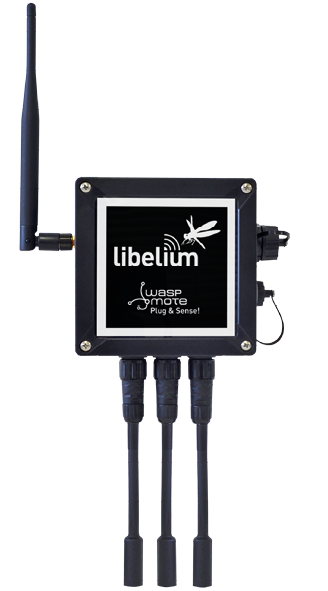
Specifications
- Material: polycarbonate
- Sealing: polyurethane
- Cover screws: stainless steel
- Ingress protection: IP65
- Impact resistance: IK08
- Rated insulation voltage AC: 690 V
- Rated insulation voltage DC: 1000 V
- Heavy metals-free: Yes
- Weatherproof: true - nach UL 746 C
- Ambient temperature (min.): -30 °C*
- Ambient temperature (max.): 70 °C*
- Approximated weight: 800 g
*Temporary extreme temperatures are supported. Regular recommended usage: -20, +60 °C.
In the pictures included below it is shown a general view of Waspmote Plug & Sense! main parts. Some elements are dedicated to node control, others are designated to sensor connection and other parts are just identification elements. All of them will be described along this guide.

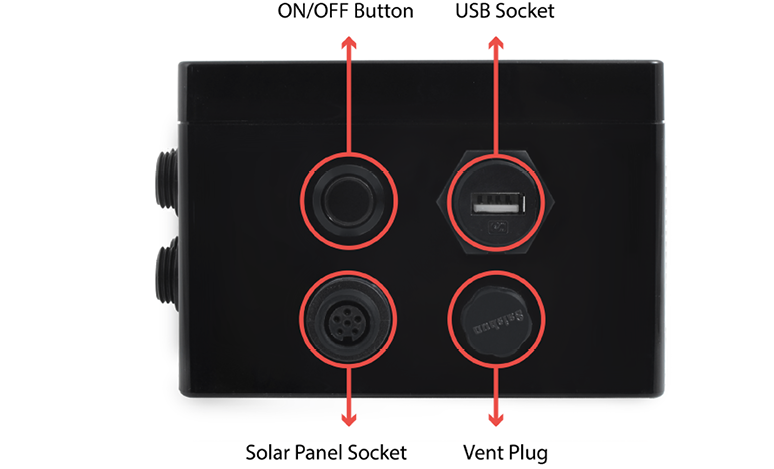
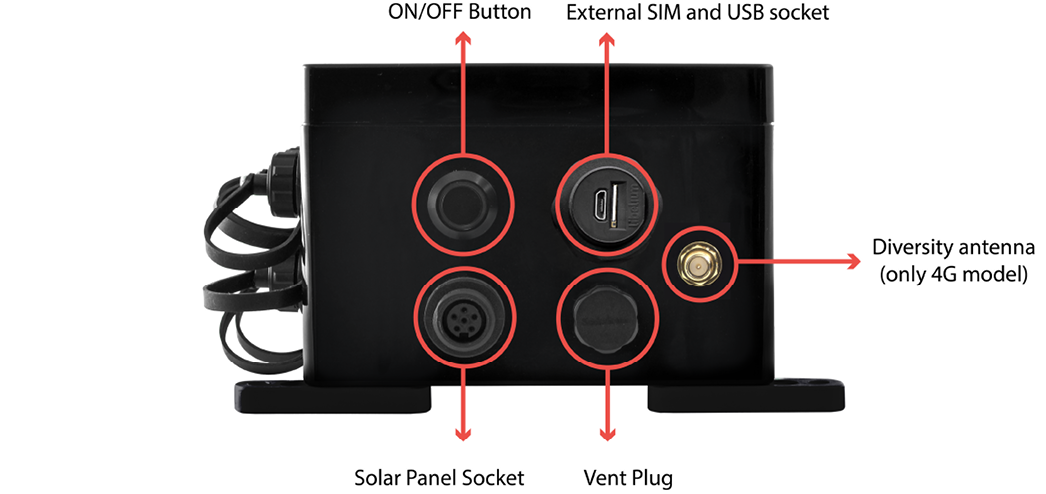
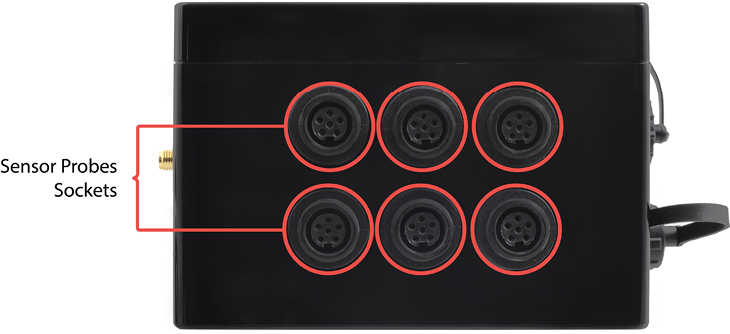
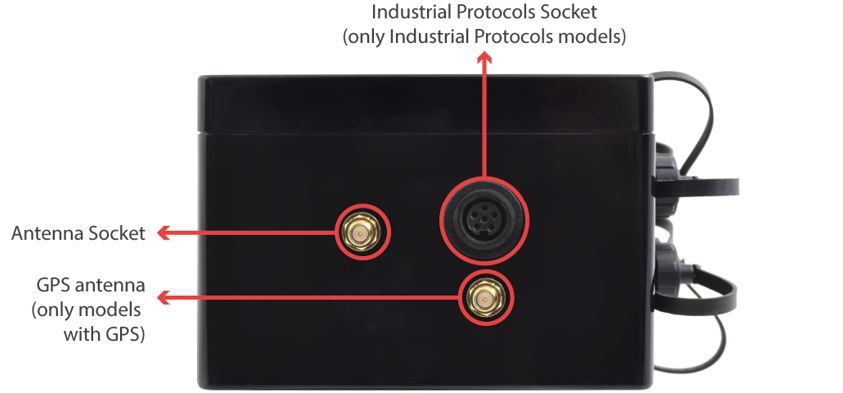
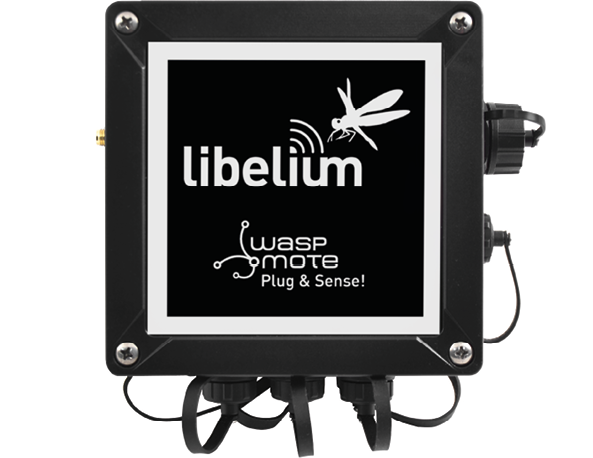

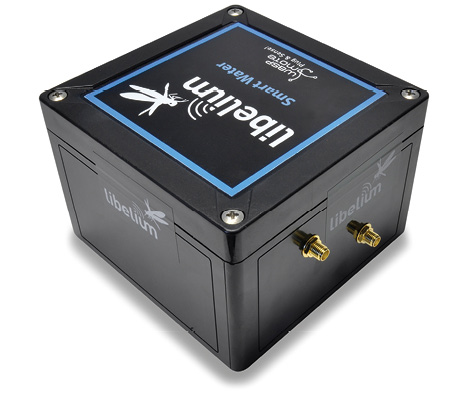
{warning.fa-dot} Important note: Do not handle black stickers seals of the enclosure (Warranty stickers). Their integrity is the proof that Waspmote Plug & Sense! has not been opened. If they have been handled, damaged or broken, the warranty is automatically void.
Parts included
Next picture shows Waspmote Plug & Sense! and all of its elements. Some of them are optional accessories that may not be included.

Identification
Each Waspmote model is identified by stickers. Next figure shows front sticker.

There are many configurations of Waspmote Plug & Sense! line, all of them identified by one unique sticker. Next image shows all possibilities.
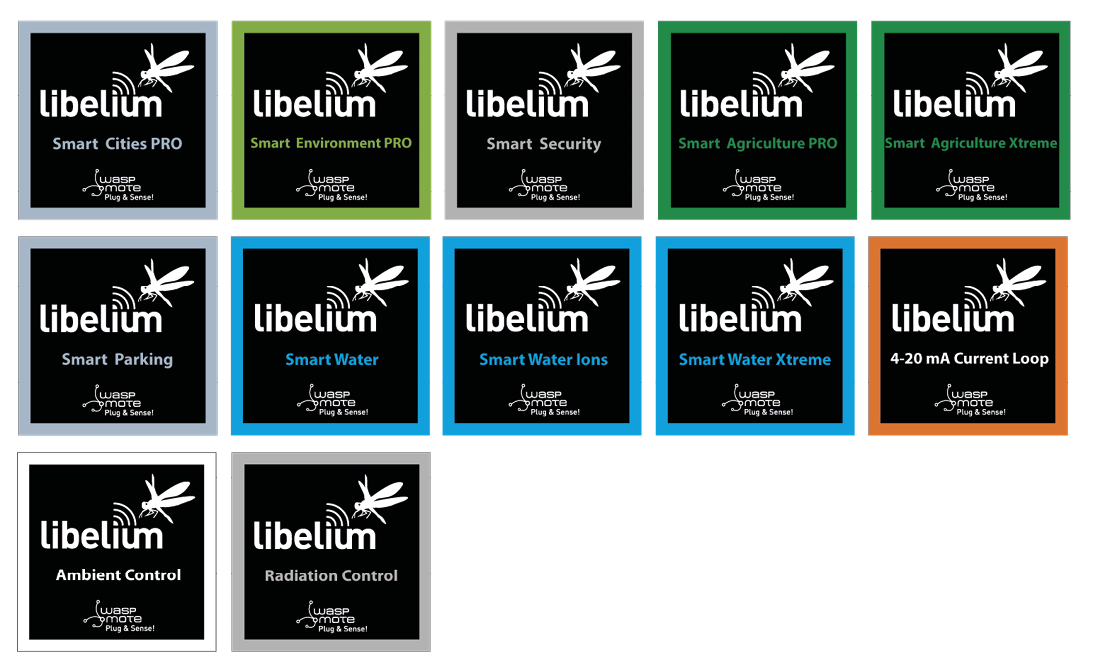
Moreover, Waspmote Plug & Sense! includes a back sticker where it is shown identification numbers, radio MAC addresses, etc. It is highly recommended to annotate this information and save it for future maintenance. Next figure shows it in detail.
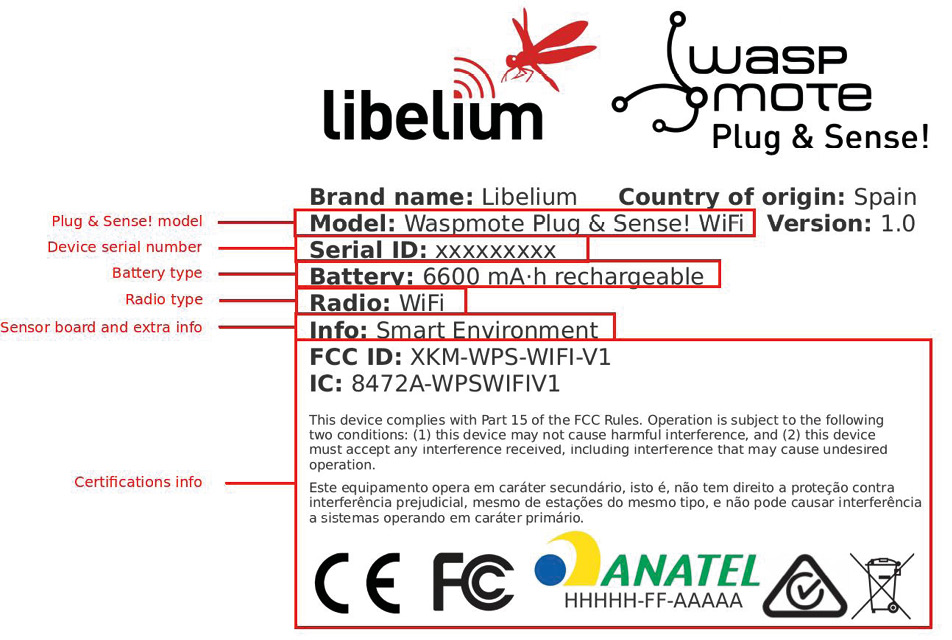
Sensor probes are identified too by a sticker showing the measured parameter and the sensor manufacturer reference.

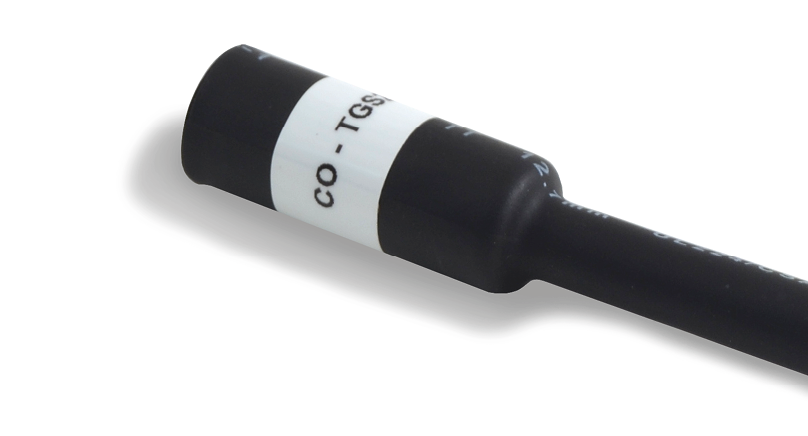
Sensor probes
Sensor probes can be easily attached by just screwing them into the bottom sockets. This allows you to add new sensing capabilities to existing networks just in minutes. In the same way, sensor probes may be easily replaced in order to ensure the lowest maintenance cost of the sensor network.
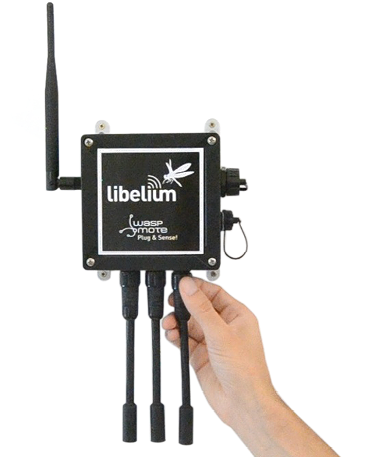
{warning.fa-dot} Go to the Plug & Sense! Sensor Guide to know more about our sensor probes.
Solar powered
The battery can be recharged using the waterproof USB cable but also the external solar panel option.
The external solar panel is mounted on a 45o holder which ensures the maximum performance of each outdoor installation.
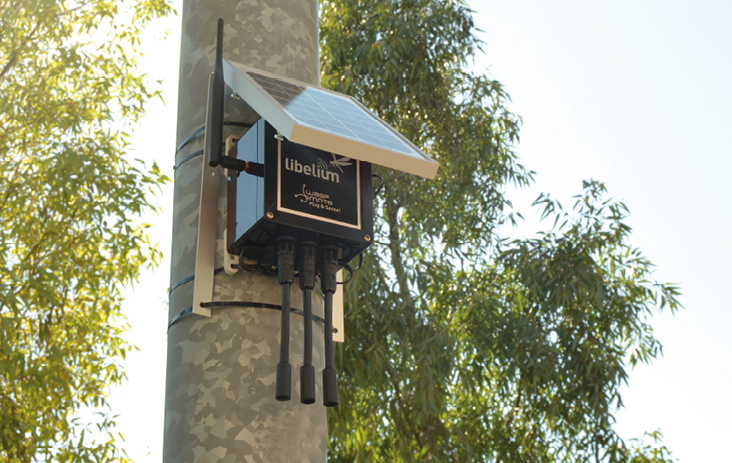
External Battery Module
The External Battery Module (EBM) is an accessory to extend the battery life of Plug & Sense!. The extension period may be from months to years depending on the sleep cycle and radio activity. The daily charging period is selectable among 5, 15 and 30 minutes with a selector switch and it can be combined with a solar panel to extend even more the node’s battery lifetime.
{warning.fa-dot} Note: Nodes using solar panel can keep using it through the External Battery Module. The EBM is connected to the solar panel connector of Plug & Sense! and the solar panel unit is connected to the solar panel connector of the EBM.
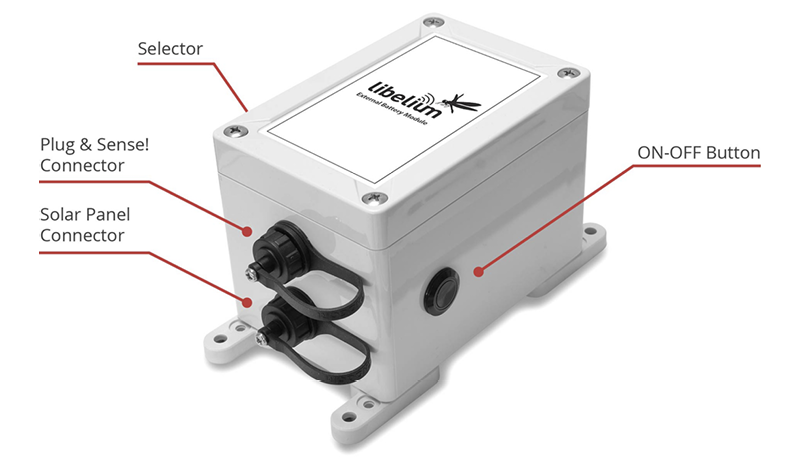
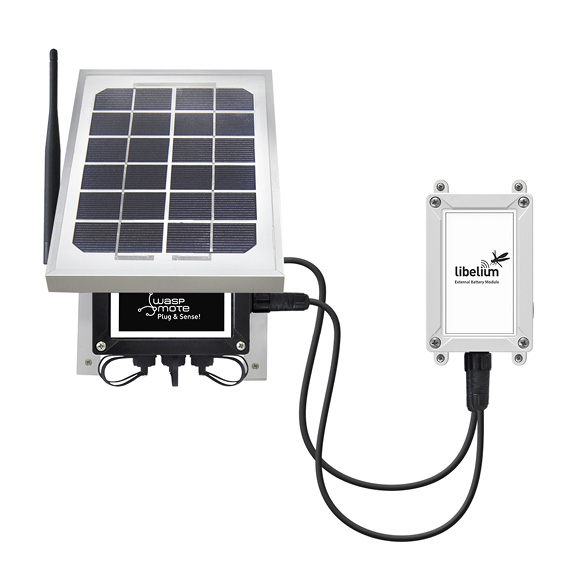
Programming the Nodes
Waspmote Plug & Sense! can be reprogrammed in two ways:
The basic programming is done from the USB port. Just connect the USB to the specific external socket and then to the computer to upload the new firmware.
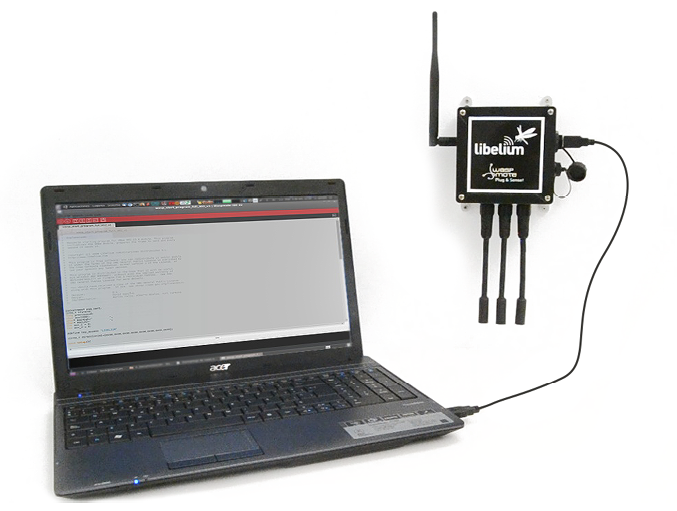
Over the Air Programming (OTAP) is also possible once the node has been installed (via WiFi or 4G radios). With this technique you can reprogram, wireless, one or more Waspmote sensor nodes at the same time by using a laptop and Meshlium.
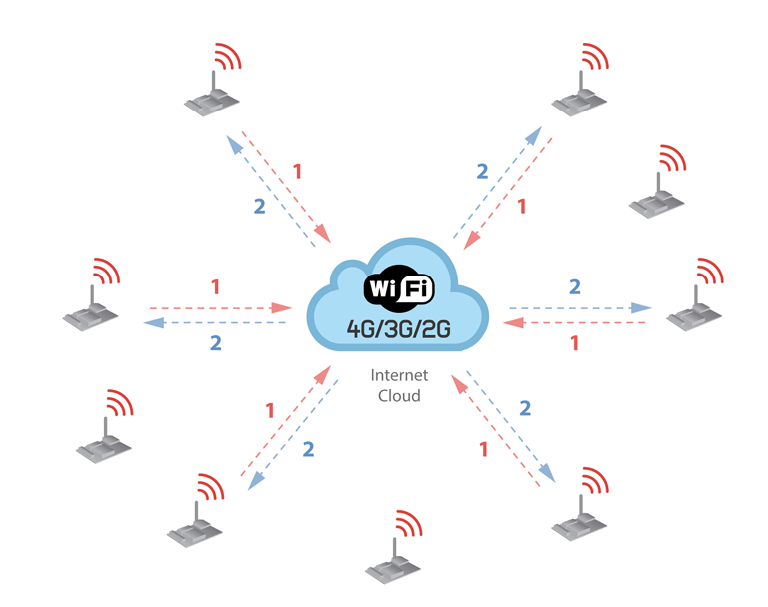
Program in minutes
The Programming Cloud Service is an intuitive graphic interface which creates code automatically. The user just needs to to fill a web form to obtain binaries for Plug & Sense!. Advanced programming options are available, depending on the license selected.
Check how easy it is to handle the Programming Cloud Service at: https://cloud.libelium.com/
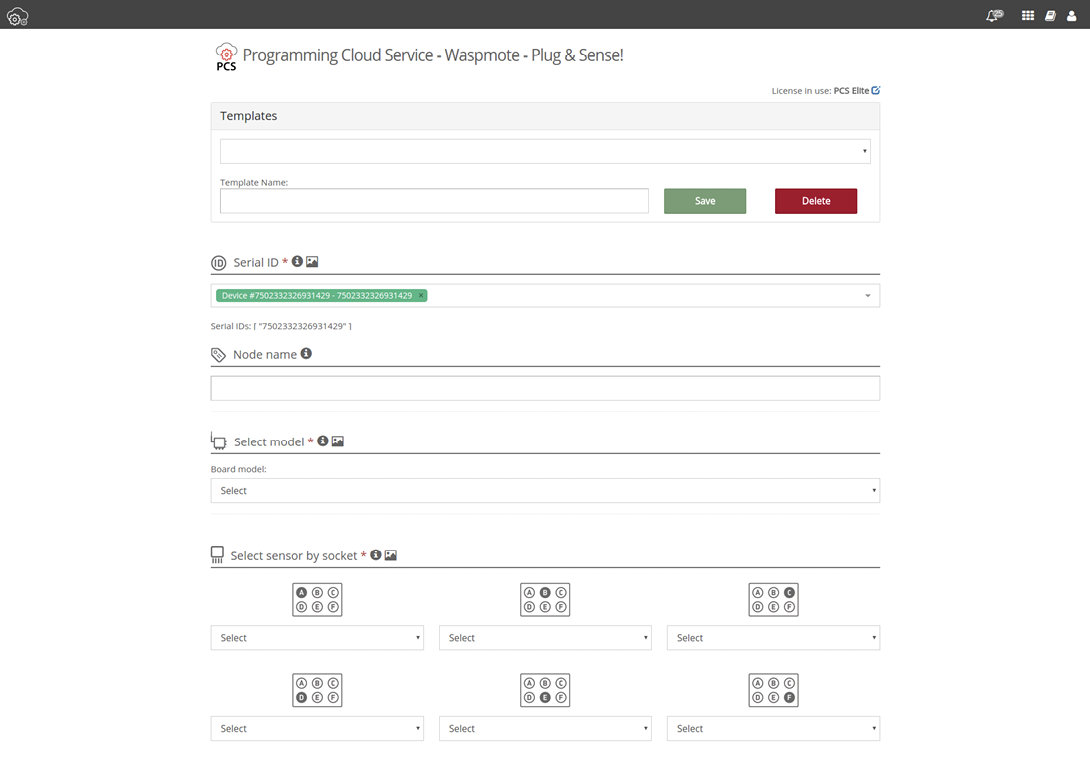
Radio interfaces
| Radio | Protocol | Frequency bands | Transmission power | Sensitivity | Range* | Certification |
|---|---|---|---|---|---|---|
| XBee-PRO 802.15.4 EU | 802.15.4 | 2.4 GHz | 10 dBm | -100 dBm | 750 m | CE |
| XBee-PRO 802.15.4 | 802.15.4 | 2.4 GHz | 18 dBm | -100 dBm | 1600 m | FCC, IC, ANATEL, RCM |
| XBee ZigBee 3 | ZigBee 3 | 2.4 GHz | 8 dBm | -103 dBm | 1200 m | CE |
| XBee 868LP | RF | 868 MHz | 14 dBm | -106 dBm | 8.4 km | CE |
| XBee 900HP US | RF | 900 MHz | 24 dBm | -110 dBm | 15.5 km | FCC, IC |
| XBee 900HP BR | RF | 900 MHz | 24 dBm | -110 dBm | 15.5 km | ANATEL |
| XBee 900HP AU | RF | 900 MHz | 24 dBm | -110 dBm | 15.5 km | RCM |
| WiFi | WiFi (HTTP(S), FTP, TCP, UDP) | 2.4 GHz | 17 dBm | -94 dBm | 500 m | CE, FCC, IC, ANATEL, RCM |
| 4G EU/BR v2 | 4G/3G/2G (HTTP, FTP, TCP, UDP) | 800, 900, 1800, 2100, 2600 MHz | 4G: class 3 (0.2 W, 23 dBm) | 4G: -102 dBm |
-km - Typical base station range |
CE, ANATEL |
| 4G US v2 | 4G/3G (HTTP, FTP, TCP, UDP) | 700, 850, 1700, 1900 MHz | 4G: class 3 (0.2 W, 23 dBm) | 4G: -103 dBm |
-km - Typical base station range |
FCC, IC, PTCRB, AT&T |
| 4G AU | 4G (HTTP, FTP, TCP, UDP) | 700, 1800, 2600 MHz | 4G: class 3 (0.2 W, 23 dBm) | 4G: -102 dBm |
-km - Typical base station range |
RCM |
| NB-IoT / Cat-M | Cat NB1 / Cat M1 / EGPRS (HTTP, FTP, TCP, UDP, MQTT) | B1 / B2 / B3 / B4 / B5 / B8 / B12 / B13 / B18 / B19 / B20 / B25 / B26 / B28 / B39 | Cat NB1 / Cat M1 / EGPRS compliant | -113 dBm (NB-IoT) |
-km - Typical base station range |
- |
| Sigfox EU | Sigfox | 868 MHz | 16 dBm | -126 dBm |
-km - Typical base station range |
CE |
| Sigfox US | Sigfox | 900 MHz | 24 dBm | -127 dBm |
-km - Typical base station range |
FCC, IC |
| Sigfox AU / APAC / LATAM | Sigfox | 900 MHz | 24 dBm | -127 dBm |
-km - Typical base station range |
- |
| LoRaWAN EU | LoRaWAN | 868 MHz | 14 dBm | -136 dBm | > 15 km | CE |
| LoRaWAN US | LoRaWAN | 902-928 MHz | 18.5 dBm | -136 dBm | > 15 km | FCC, IC |
| LoRaWAN AU | LoRaWAN | 915-928 MHz | 18.5 dBm | -136 dBm | > 15 km | - |
| LoRaWAN IN | LoRaWAN | 865-867 MHz | 18.5 dBm | -136 dBm | > 15 km | - |
| LoRaWAN ASIA-PAC / LATAM | LoRaWAN | 923 MHz | 18.5 dBm | -136 dBm | > 15 km | - |
| LoRaWAN JP / KR | LoRaWAN | 923 MHz, 920-923 MHz | 16 dBm / 14 dBm | -135.5 dBm | > 15 km | - |
*Line of sight and Fresnel zone clearance with 5 dBi dipole antenna.
Industrial Protocols
Besides the main radio of Waspmote Plug & Sense!, it is possible to have an Industrial Protocol module as a secondary communication option. This is offered as an accessory feature.
The available Industrial Protocols are RS-485, Modbus (software layer over RS-485) and CAN Bus. This optional feature is accessible through an additional, dedicated socket on the antenna side of the enclosure.
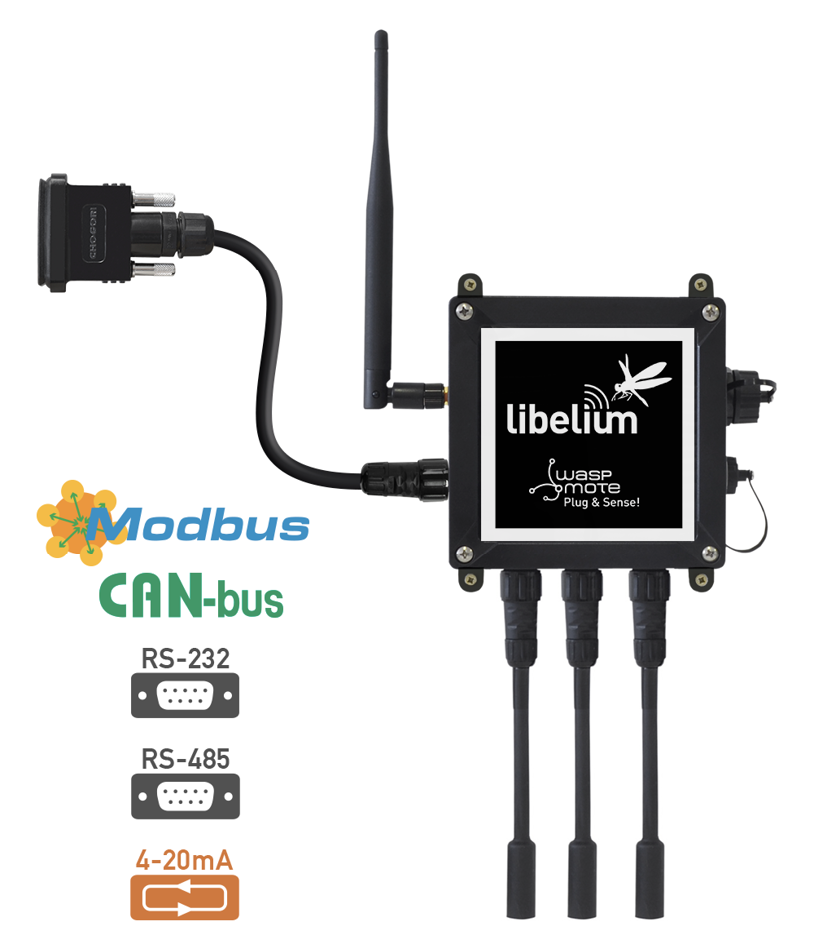
Finally, the user can choose between 2 probes to connect the desired Industrial Protocol: A standard DB9 connector and a waterproof terminal block junction box. These options make the connections on industrial environments or outdoor applications easier.
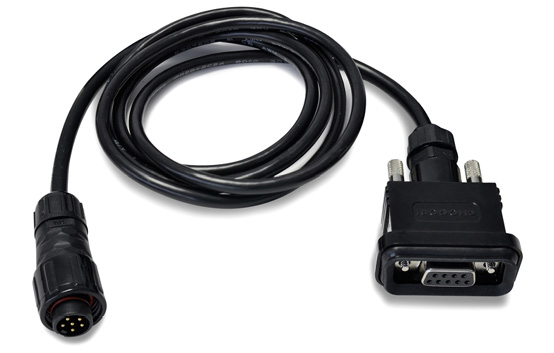
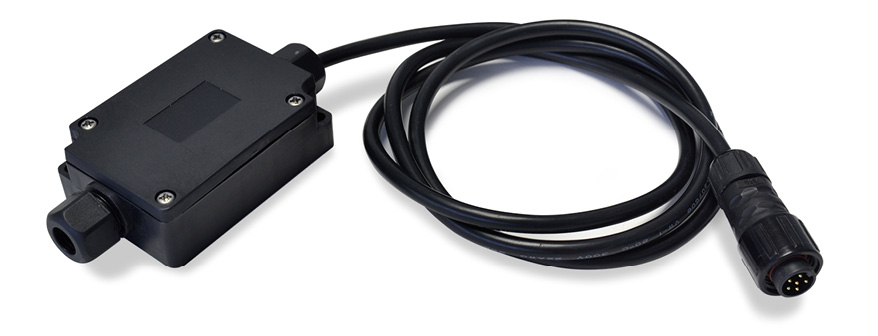
GPS
Any Plug & Sense! node can incorporate a GPS receiver in order to implement real-time asset tracking applications. The user can also take advantage of this accessory to geolocate data on a map. An external, waterproof antenna is provided; its long cable enables better installation for maximum satellite visibility.
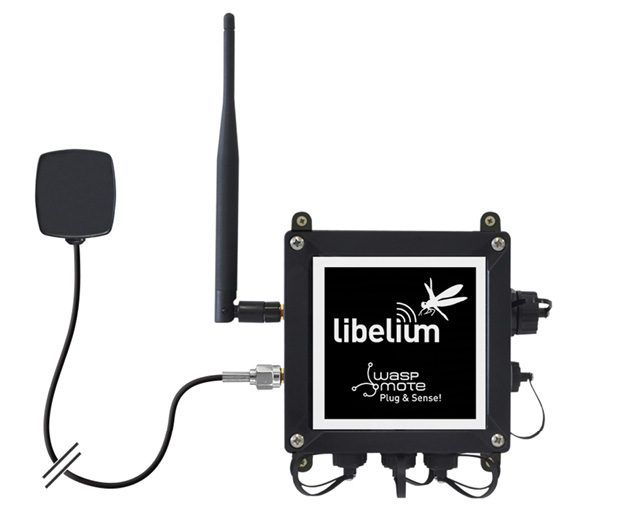
Chipset: JN3 (Telit)
Sensitivity:
- Acquisition: -147 dBm
- Navigation: -160 dBm
- Tracking: -163 dBm
Hot start time: <1 s
Cold start time: <35 s
Positional accuracy error < 2.5 m
Speed accuracy < 0.01 m/s
Antenna:
- Cable length: 2 m
- Connector: SMA
- Gain: 26 dBi (active)
Available information: latitude, longitude, altitude, speed, direction, date&time and ephemeris management
Models
There are some defined configurations of Waspmote Plug & Sense! depending on which sensors are going to be used. Waspmote Plug & Sense! configurations allow to connect up to six sensor probes at the same time.
Each model takes a different conditioning circuit to enable the sensor integration. For this reason, each model allows connecting just its specific sensors.
This section describes each model configuration in detail, showing the sensors which can be used in each case and how to connect them to Waspmote. In many cases, the sensor sockets accept the connection of more than one sensor probe. See the compatibility table for each model configuration to choose the best probe combination for the application.
{warning.fa-dot} It is very important to remark that each socket is designed only for one specific sensor, so they are not interchangeable. Always be sure you have connected the probes in the right socket. Otherwise, they can be damaged.
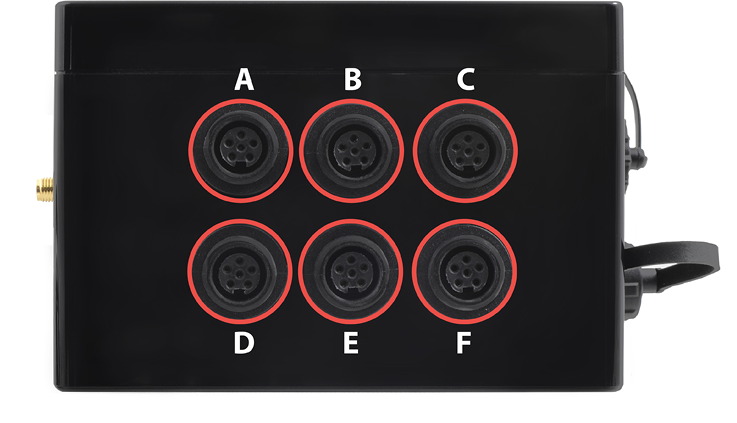
Smart Environment PRO
The Smart Environment PRO model has been created as an evolution of Smart Environment. It enables the user to implement pollution, air quality, industrial, environmental or farming projects with high requirements in terms of high accuracy, reliability and measurement range as the sensors come calibrated from factory.
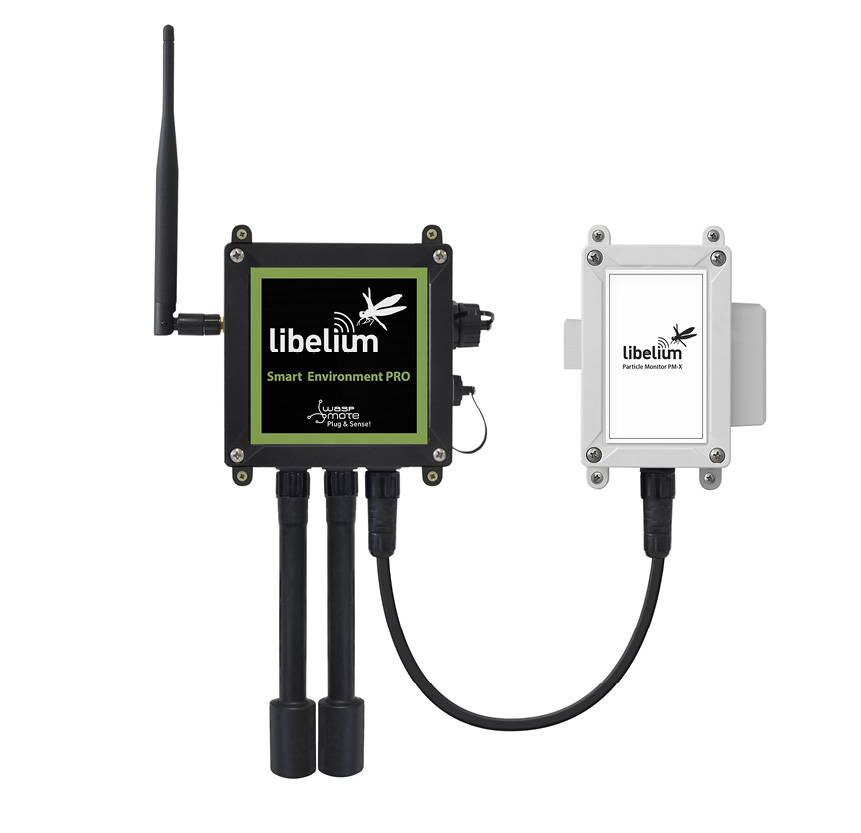
Sensor sockets are configured as shown in the figure below.
| Sensor Socket | Parameter | Reference |
|---|---|---|
| A, B, C or F | Carbon Monoxide (CO) for low concentrations [Calibrated] | 9371-LC-P |
| A, B, C or F | Carbon Dioxide (CO 2 ) [Calibrated] | 9372-P |
| A, B, C or F | Oxygen (O 2 ) [Calibrated] | 9373-P |
| A, B, C or F | Ozone (O 3 ) [Calibrated] | 9374-P |
| A, B, C or F | Nitric Oxide (NO) for low concentrations [Calibrated] | 9375-LC-P |
| A, B, C or F | Nitric Dioxide (NO 2 ) high accuracy [Calibrated] | 9376-HA-P |
| A, B, C or F | Sulfur Dioxide (SO 2 ) high accuracy [Calibrated] | 9377-HA-P |
| A, B, C or F | Ammonia (NH 3 ) for low concentrations [Calibrated] | 9378-LC-P |
| A, B, C or F | Ammonia (NH 3 ) for high concentrations [Calibrated] | 9378-HC-P |
| A, B, C or F | Methane (CH 4 ) and Combustible Gas [Calibrated] | 9379-P |
| A, B, C or F | Hydrogen Sulfide (H 2 S) [Calibrated] | 9381-P |
| D | Particle Matter (PM1 / PM2.5 / PM10) - Dust | 9387-P |
| E | Temperature, humidity and pressure | 9370-P |
| E | Luminosity (Luxes accuracy) | 9325-P |
| E | Ultrasound (distance measurement) | 9246-P |
{warning.fa-dot} For more technical information about each sensor probe go to the Development section on the Libelium website.
Calibrated gas sensors are manufactured once the order has been placed to ensure maximum durability of the calibration feature. The manufacturing process and delivery may take from 4 to 6 weeks. The lifetime of calibrated gas sensors is 6 months working at maximum accuracy. We strongly encourage our customers to buy extra gas sensors to replace the original ones after that time to ensure maximum accuracy and performance.
Smart Security
The main applications for this Waspmote Plug & Sense! configuration are perimeter access control, liquid presence detection and doors and windows openings. Besides, a relay system allows this model to interact with external electrical machines.
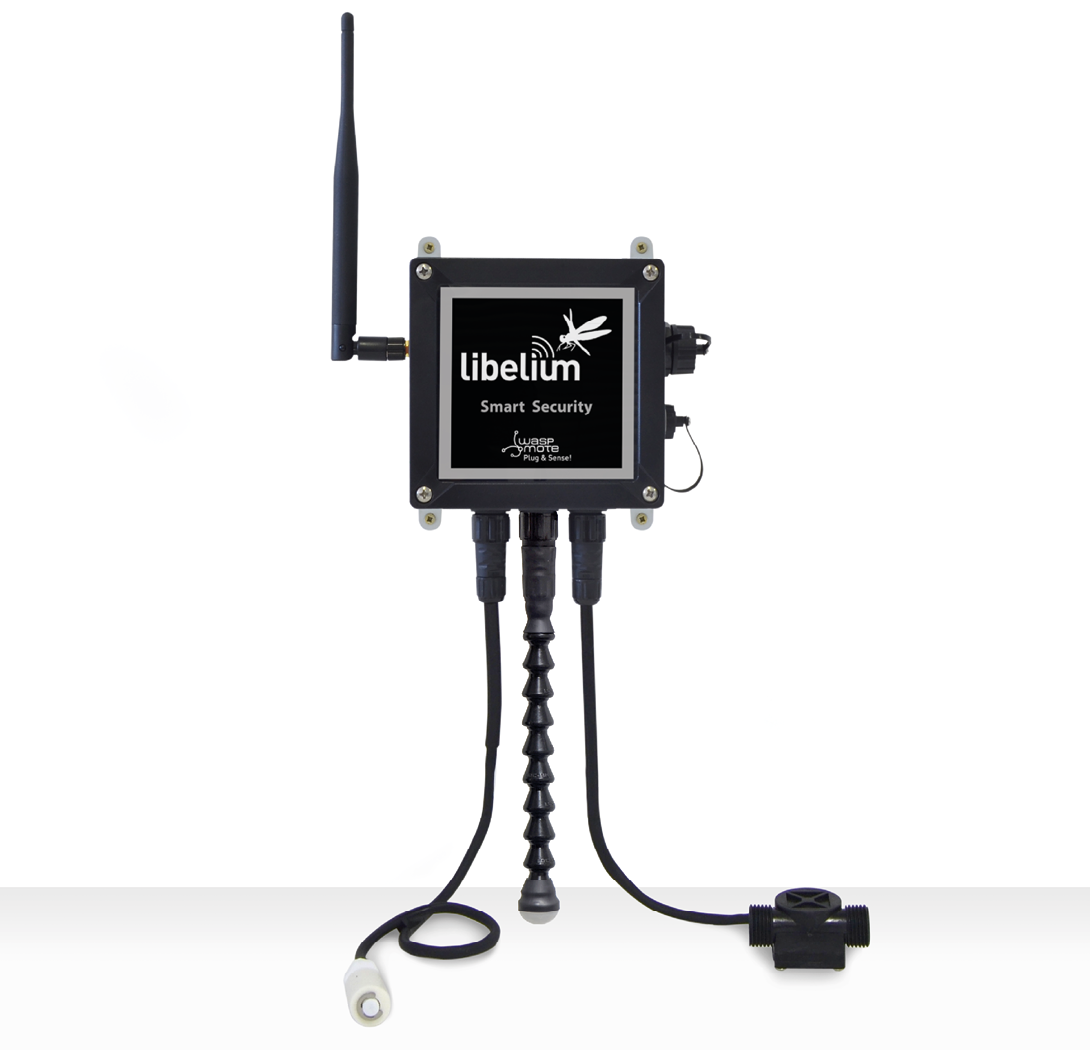
{warning.fa-dot} The probes attached in this photo could not match the final location. See next table for the correct configuration.
| Sensor Socket | Parameter | Reference |
|---|---|---|
| A, C, D or E | Temperature + Humidity + Pressure | 9370-P |
| A, C, D or E | Luminosity (Luxes accuracy) | 9325-P |
| A, C, D or E | Ultrasound (distance measurement) | 9246-P |
| A, C, D or E | Presence - PIR | 9212-P |
| A, C, D or E | Liquid Level (combustible, water) | 9239-P, 9240-P |
| A, C, D or E | Liquid Presence (Point, Line) | 9243-P, 9295-P |
| A, C, D or E | Hall Effect | 9207-P |
| B | Liquid Flow (small, medium) | 9296-P, 9297-P |
| F | Relay Input-Output | 9270-P |
As we see in the figure below, thanks to the directional probe, the presence sensor probe (PIR) may be placed in different positions. The sensor can be focused directly to the point we want.
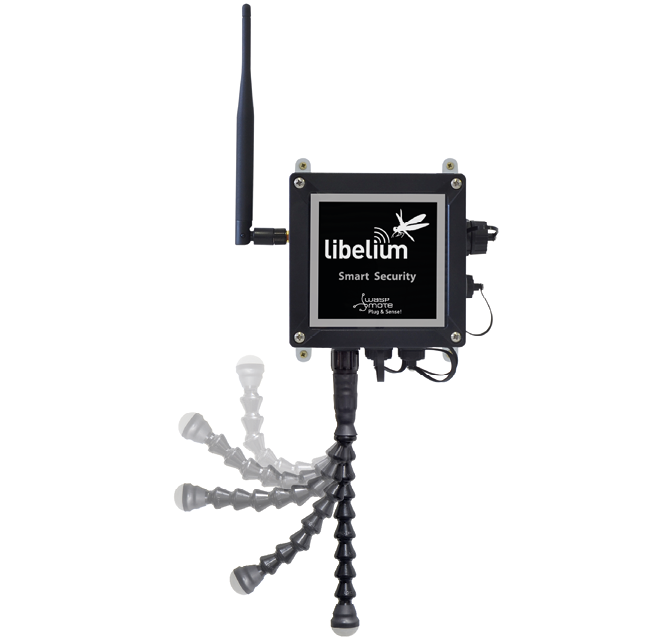
{warning.fa-dot} For more technical information about each sensor probe go to the Development section on the Libelium website.
Smart Water
The Smart Water model has been conceived to facilitate the remote monitoring of the most relevant parameters related to water quality. With this platform you can measure more than 5 parameters, including the most relevant for water control such as dissolved oxygen, oxidation-reduction potential, pH, conductivity and temperature.
The Smart Water Ions line is complementary for these kinds of projects, enabling the control of concentration of ions like Ammonium (NH 4+ ), Bromide (Br - ), Calcium (Ca 2+ ), Chloride (Cl - ), Cupric (Cu 2+ ), Fluoride (F - ), Iodide (I - ), Lithium (Li + ), Magnesium (Mg 2+ ), Nitrate (NO 3- ), Nitrite (NO 2- ), Perchlorate (ClO 4- ), Potassium (K + ), Silver (Ag + ), Sodium (Na + ) and pH. Take a look to the Smart Water Ions line in the next section.
Refer to Libelium website for more information.
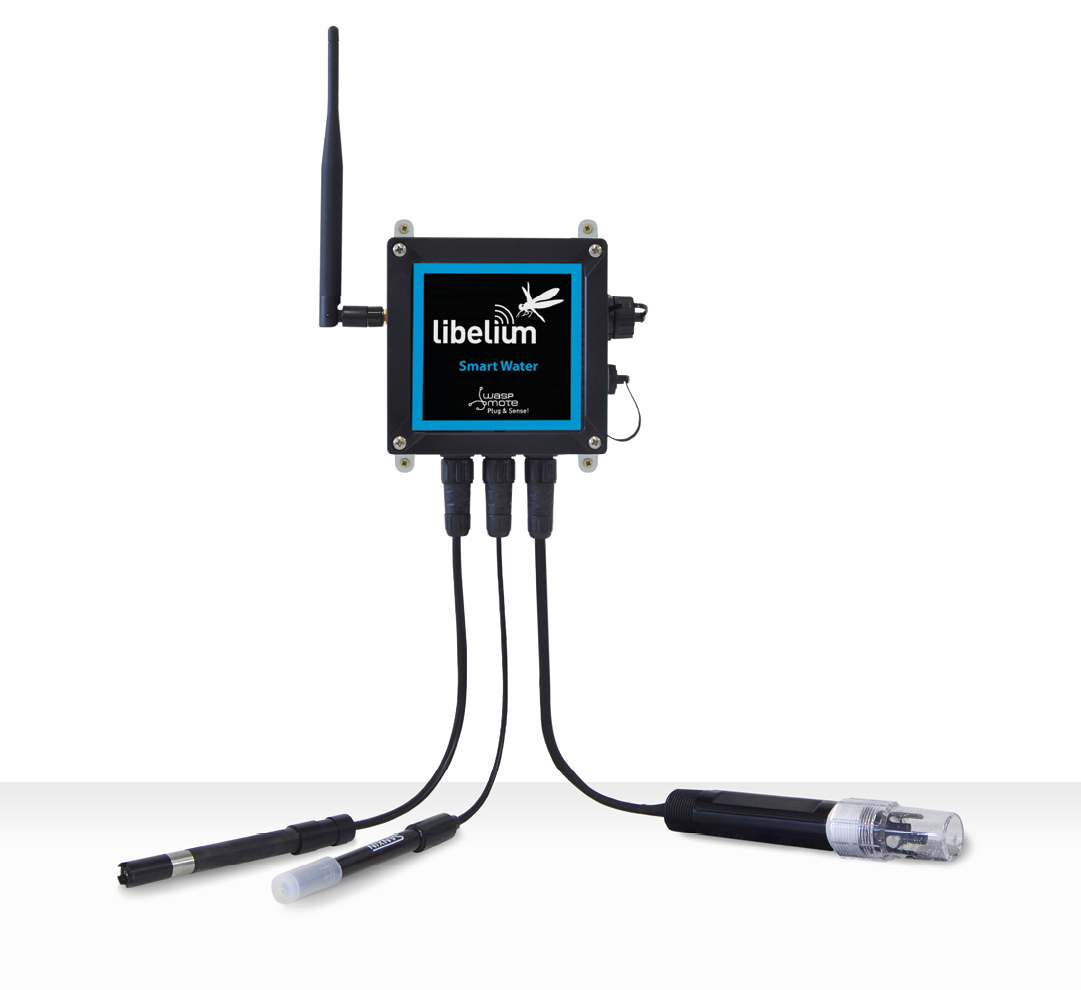
Sensor sockets are configured as shown in the figure below.
| Sensor Socket | Parameter | Reference |
|---|---|---|
| A | pH | 9328 |
| B | Dissolved Oxygen (DO) | 9327 |
| C | Conductivity | 9326 |
| E | Oxidation-Reduction Potential (ORP) | 9329 |
| F | Soil/Water Temperature | 9255-P (included by default) |
{warning.fa-dot} For more technical information about each sensor probe go to the Development section on the Libelium website.
Smart Water Xtreme
Smart Water Xtreme was created as an evolution of Smart Water. This model integrates high-end sensors, calibrated in factory, with enhanced accuracy and performance. Their reduced recalibration requirements and robust design enlarge maintenance periods, making it more affordable to deploy remote Smart Water applications. This line includes a great combination of the most significant water parameters like dissolved oxygen, pH, oxidation- reduction potential, conductivity, salinity, turbidity, suspended solids, sludge blanket and temperature.
Refer to Libelium website for more information.
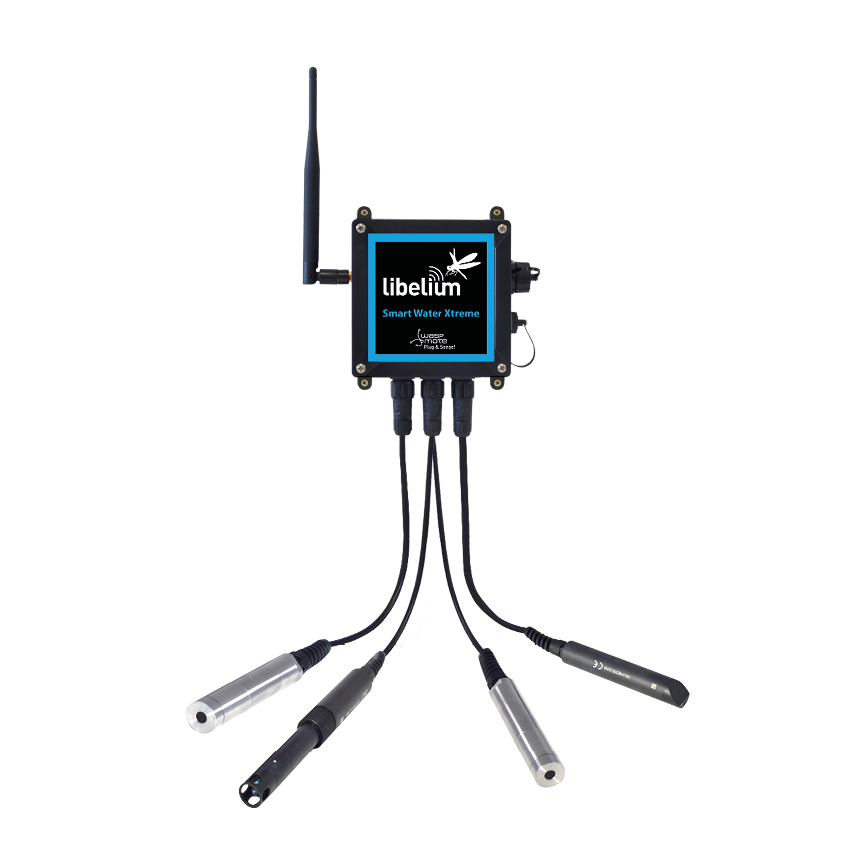
{warning.fa-dot} For more technical information about each sensor probe go to the Development section on the Libelium website.
Sensor sockets are configured as shown in the figure below.
| Sensor Socket | Parameter | Reference |
|---|---|---|
| A, B, C, D and E | Optical dissolved oxygen and temperature OPTOD | 9488-P |
| A, B, C, D and E | Titanium optical dissolved oxygen and temperature OPTOD | 9489-P |
| A, B, C, D and E | pH, ORP and temperature PHEHT | 9485-P |
| A, B, C, D and E | Conductivity, salinity and temperature C4E | 9486-P |
| A, B, C, D and E | Inductive conductivity, salinity and temperature CTZN | 9487-P |
| A, B, C, D and E | Turbidity and temperature NTU | 9353-P |
| A, B, C, D and E | Suspended solids, turbidity, sludge blanket and temperature MES5 | 9490-P |
| A, B, C, D and E | COD, BOD, TOC, SAC254 and temp StacSense, 2 mm path | 9500-P |
| A, B, C, D and E | COD, BOD, TOC, SAC254 and temp StacSense, 50 mm path | 9501-P |
| A, B, C and D | Radar level VEGAPULS C21 | 9514-P |
| A and D | Temperature, air humidity and pressure | 9370-P |
| A and D | Luxes | 9325-P |
| A and D | Ultrasound | 9246-P |
| F | Total coliform bacteria, TLF, turbidity and temperature Proteus | 9513-P |
| F | Manta+ 35A sensor probe | 9495-P |
| F | Manta+ 35B sensor probe | |
| F | Chlorophyll sensor for Manta probe | 72470 |
| F | BGA sensor for Manta probe | 72471 |
| F | Organic matter CDOM/FDOM sensor for Manta probe | 72472 |
| F | Ammonium sensor for Manta probe | 72473 |
| F | Nitrate sensor for Manta probe | 72474 |
| F | Chloride sensor for Manta probe | 72475 |
| F | Sodium sensor for Manta probe | 72476 |
| F | Calcium sensor for Manta probe | 72477 |
| F | Bromide sensor for Manta probe | 9504-P |
| F | Total Dissolved Gas TDG sensor for Manta probe | 9505-P |
| F | Rhodamine sensor for Manta probe | 9506-P |
| F | Crude oil sensor for Manta probe | 9507-P |
| F | Refined oil sensor for Manta probe | 9508-P |
| F | Flourescein sensor for Manta probe | 9509-P |
| F | Optical brighteners sensor for Manta probe | 9510-P |
| F | Tryptophan sensor for Manta probe | 9511-P |
Smart Water Ions
The Smart Water Ions models specialize in the measurement of ions concentration for drinking water quality control, agriculture water monitoring, swimming pools or waste water treatment.
The Smart Water line is complementary for these kinds of projects, enabling the control of parameters like conductivity, oxidation-reduction potential and dissolved oxygen. Take a look to the Smart Water line in the previous section. Refer to Libelium website for more information.
There are 3 variants for Smart Water Ions: Single, Double and PRO. This is related to the type of ion sensor that each variant can integrate. Next section describes each configuration in detail.
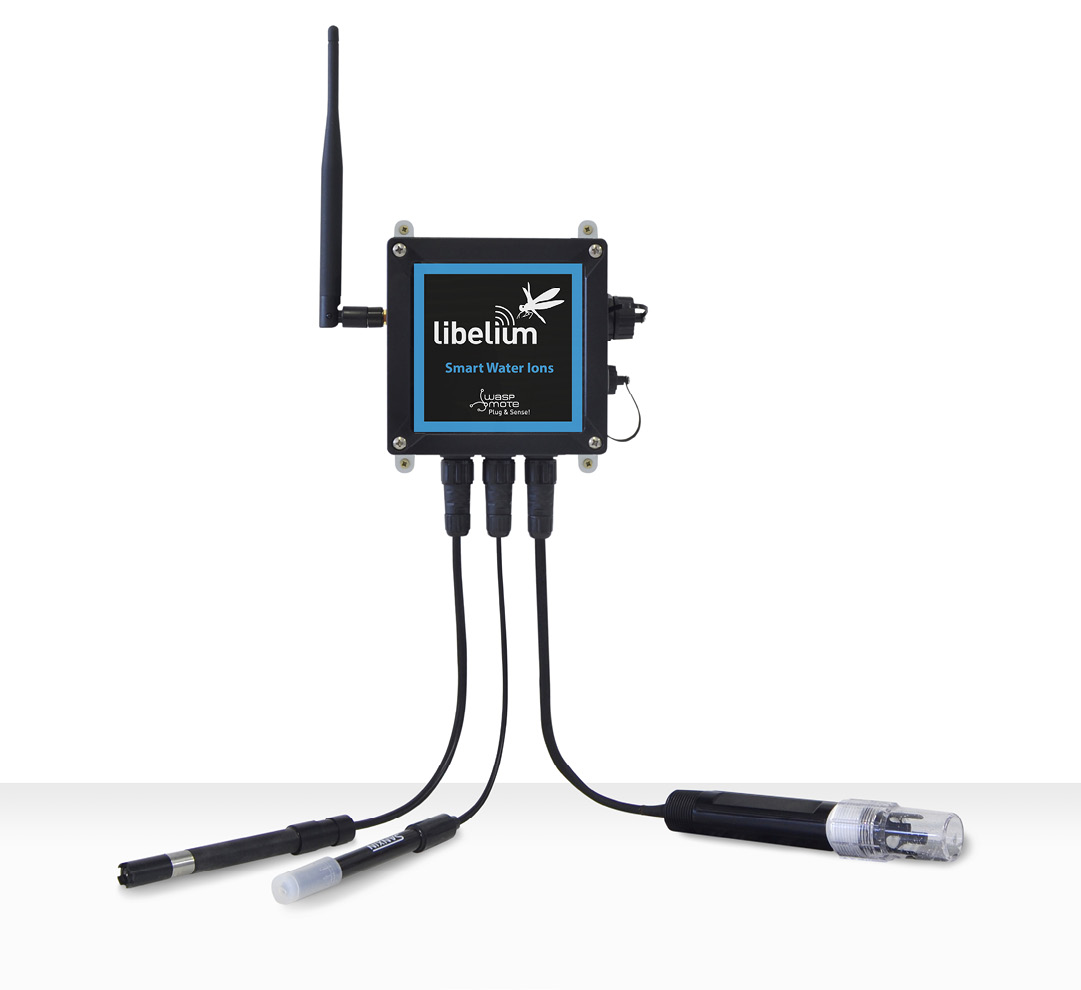
Single
This variant includes a Single Junction Reference Probe, so it can read all the single type ion sensors. Sensor sockets are configured as shown in the table below.
| Sensor Socket | Parameter | Reference |
|---|---|---|
| A, B, C and D | Fluoride Ion (F ) | 9353 |
| A, B, C and D | Fluoroborate Ion (BF4 ) | 9354 |
| A, B, C and D | Nitrate Ion (NO 3- ) | 9355 |
| A, B, C and D | pH (for Smart Water Ions) | 9363 |
| E | Single Junction Reference | 9350 (included by default) |
| F | Soil/Water Temperature | 9255-P (included by default) |
{warning.fa-dot} For more technical information about each sensor probe go to the Development section on the Libelium website.
Double
This variant includes a Double Junction Reference Probe, so it can read all the double type ion sensors. Sensor sockets are configured as shown in the table below.
| Sensor Socket | Parameter | Reference |
|---|---|---|
| A, B, C and D | Bromide Ion (Br - ) | 9356 |
| A, B, C and D | Chloride Ion (Cl - ) | 9357 |
| A, B, C and D | Cupric Ion (Cu 2+) | 9358 |
| A, B, C and D | Iodide Ion (I ) | 9360 |
| A, B, C and D | Silver Ion (Ag + ) | 9362 |
| A, B, C and D | pH (for Smart Water Ions) | 9363 |
| E | Double Junction Reference | 9351 (included by default) |
| F | Soil/Water Temperature | 9255-P (included by default) |
{warning.fa-dot} For more technical information about each sensor probe go to the Development section on the Libelium website.
Pro
This special variant integrates extreme quality sensors, with better performance than the Single or Double lines. In this case, there is only one type of reference probe and up to 16 different ion parameters can be analyzed in 4 sockets. Sensor sockets are configured as shown in the table below.
| Sensor Socket | Parameter | Reference |
|---|---|---|
| A, B, C or D | Ammonium Ion (NH 4+ ) [PRO] | 9412 |
| A, B, C or D | Bromide Ion (Br ) [PRO] | 9413 |
| A, B, C or D | Calcium Ion (Ca 2+) [PRO] | 9414 |
| A, B, C or D | Chloride Ion (Cl - ) [PRO] | 9415 |
| A, B, C or D | Cupric Ion (Cu 2+ ) [PRO] | 9416 |
| A, B, C or D | Fluoride Ion (F ) [PRO] | 9417 |
| A, B, C or D | Iodide Ion (I ) [PRO] | 9418 |
| A, B, C or D | Lithium Ion (Li + ) [PRO] | 9419 |
| A, B, C or D | Magnesium Ion (Mg 2+ ) [PRO] | 9420 |
| A, B, C or D | Nitrate Ion (NO 3- ) [PRO] | 9421 |
| A, B, C or D | Nitrite Ion (NO 2- ) [PRO] | 9422 |
| A, B, C or D | Perchlorate Ion (ClO 4- ) [PRO] | 9423 |
| A, B, C or D | Potassium Ion (K + ) [PRO] | 9424 |
| A, B, C or D | Silver Ion (Ag+ ) [PRO] | 9425 |
| A, B, C or D | Sodium Ion (Na+ ) [PRO] | 9426 |
| A, B, C or D | pH [PRO] | 9411 |
| E | Reference Sensor Probe [PRO] | 9410 (included by default) |
| F | Soil/Water Temperature | 9255-P (included by default) |
{warning.fa-dot} For more technical information about each sensor probe go to the Development section on the Libelium website.
Smart Parking
The Smart Parking node allows to detect available parking spots by placing the node on the pavement. It works with a radar sensor and a magnetic sensor which detect when a vehicle is present or not.
The node benefits from LoRaWAN technology, getting ubiquitous coverage with few base stations. The device is very optimized in terms of power consumption, resulting in a long battery life. Its small size and the robust and surface-mount enclosure enables a fast installation, without the need of digging a hole in the ground. Finally, the developer does not need to program the node, but just configure some key parameters. Remote management and bidirectional communication allow to change parameters from the Cloud.
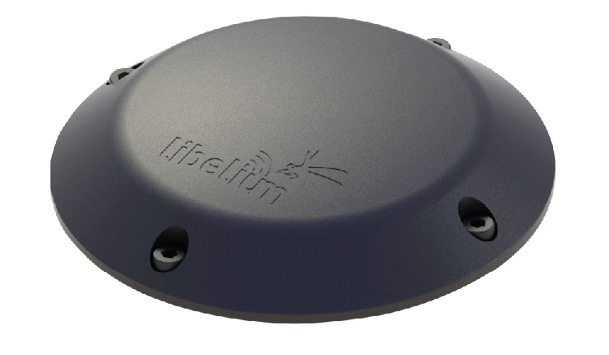
{warning.fa-dot} There are specific documents for parking applications on the Libelium website. Refer to the Smart Parking Technical Guide to see typical applications for this model and how to make a good installation.
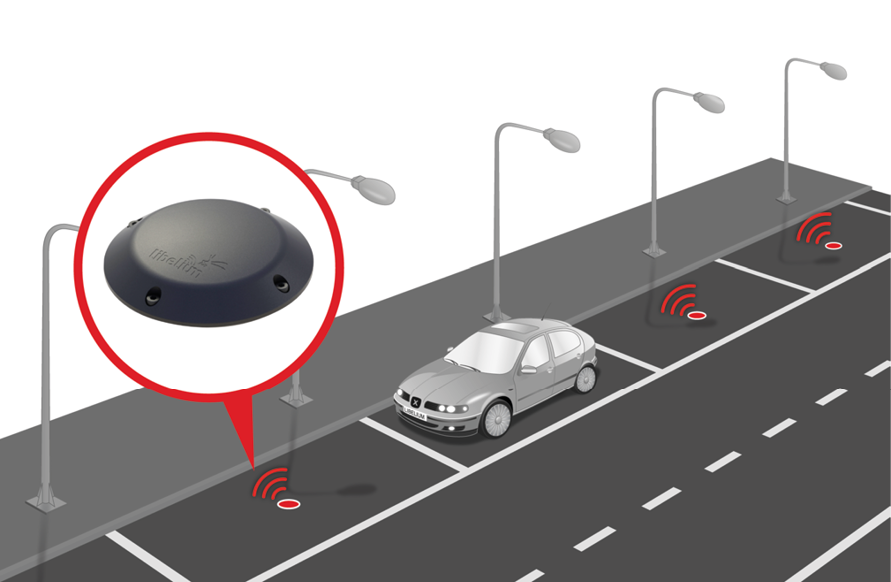
Smart Agriculture PRO
The Smart Agriculture models allow to monitor multiple environmental parameters involving a wide range of applications. It has been provided with sensors for air and soil temperature and humidity, solar visible radiation, wind speed and direction, rainfall, atmospheric pressure, etc.
The main applications for this Waspmote Plug & Sense! model are precision agriculture, irrigation systems, greenhouses, weather stations, etc. Refer to Libelium website for more information.
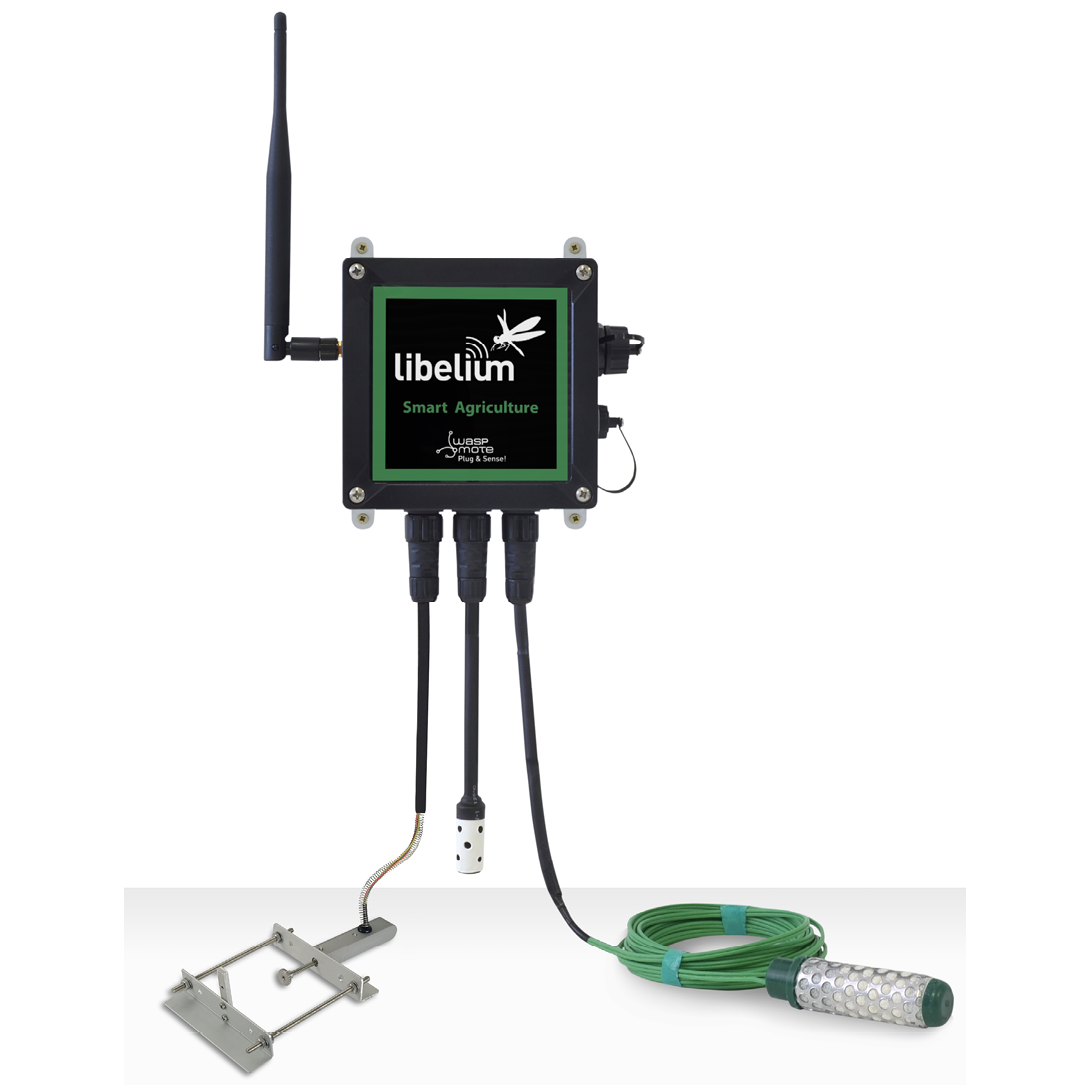
Sensor sockets are configured as shown in the figure below.
| Sensor Socket | Parameter | Reference |
|---|---|---|
| A | Weather Station WS-3000 (anemometer + wind vane + pluviometer) | 9256-P |
| B | Soil Moisture 1 | 9248-P, 9324-P, 9323-P |
| B | Solar Radiation (PAR) | 9251-P |
| B | Ultraviolet Radiation | 9257-P |
| C | Dendrometers | 9248-P, 9324-P, 9323-P |
| C | Dendrometers | 9252-P, 9253-P, 9254-P |
| D (digital bus) | Soil Temperature (Pt-1000) | 9255-P |
| D (digital bus) | Temperature + Humidity + Pressure | 9370-P |
| D (digital bus) | Luminosity (Luxes accuracy) | 9325-P |
| D (digital bus) | Ultrasound (distance measurement) | 9246-P |
| E | Leaf Wetness | 9249-P |
| E | Soil Moisture 2 | 9248-P, 9324-P, 9323-P |
| F (digital bus) | Temperature + Humidity + Pressure | 9370-P |
| F (digital bus) | Luminosity (Luxes accuracy) | 9325-P |
| F (digital bus) | Ultrasound (distance measurement) | 9246-P |
*Ask Libelium Sales Department for more information.
{warning.fa-dot} For more technical information about each sensor probe go to the Development section on the Libelium website.
Smart Agriculture Xtreme
The Plug & Sense! Smart Agriculture Xtreme is an evolution of our Agriculture line with a new selection of high- end professional sensors. It allows to monitor multiple environmental parameters involving a wide range of applications, from plant growing analysis to weather observation. There are sensors for atmospheric and soil monitoring and plants health. Up to 33 sensors can be connected.
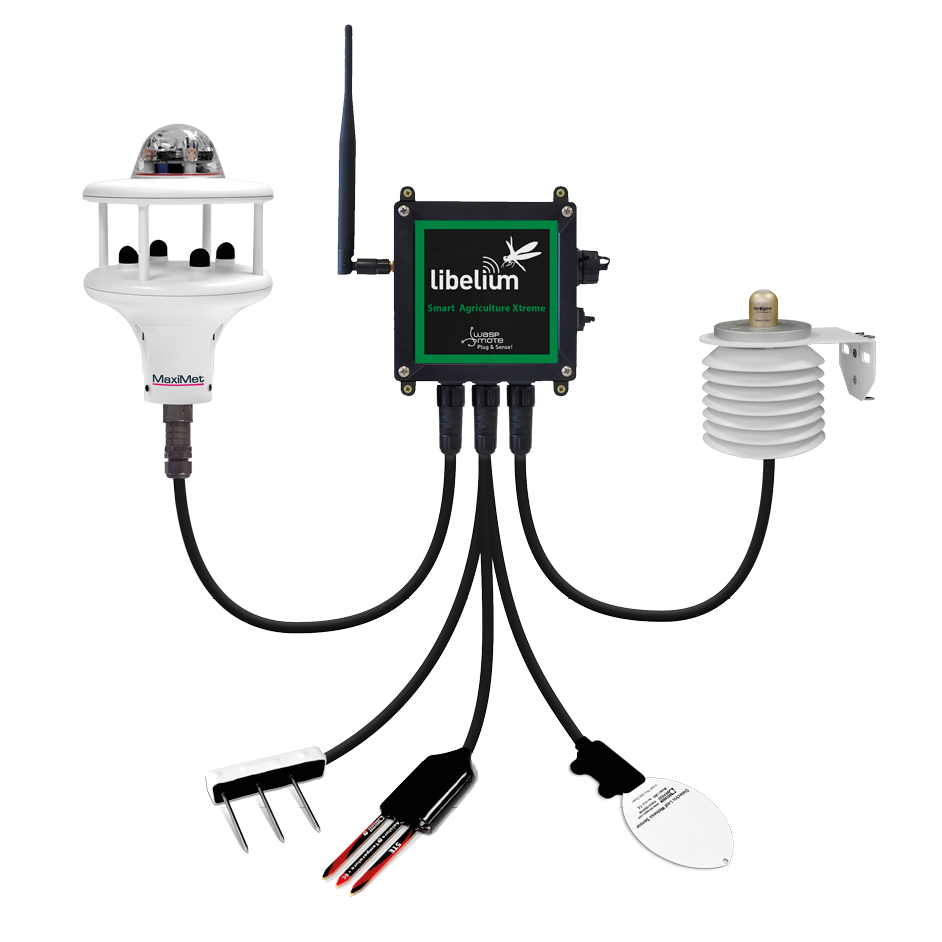
Sensor sockets are configured as shown in the figure below.
| Sensor Socket | Parameter | Reference |
|---|---|---|
| A and D | Non-contact surface temperature measurement SI-411 | 9468-P |
| A and D | Leaf and flower bud temperature SF-421 | 9467-P |
| A and D | Soil oxygen level SO-411 | 9469-P |
| A and D | Conductivity, water content and soil temperature 5TE | 9402-P |
| A and D | Conductivity, water content and soil temperature GS3 | 9464-P |
| A and D | Volumetric water content and soil temperature TEROS 11 | 9512-P |
| A and D | Conductivity, water content and soil temperature TEROS 12 | 9499-P |
| A and D | Soil temperature and volumetric water content 5TM | 9460-P |
| A and D | Soil water potential TEROS 21 | 9465-P |
| A and D | Vapor pressure, humidity, temperature, and atmospheric pressure in soil and air VP-4 | 9471-P |
| A and D | Temperature, air humidity and pressure | 9370-P |
| A and D | Luxes | 9325-P |
| A and D | Ultrasound | 9246-P |
| B | Non-contact surface temperature measurement SI-411 | 9468-P |
| B | Leaf and flower bud temperature SF-421 | 9467-P |
| B | Soil oxygen level SO-411 | 9469-P |
| B | Conductivity, water content and soil temperature 5TE | 9402-P |
| B | Conductivity, water content and soil temperature GS3 | 9464-P |
| B | Volumetric water content and soil temperature TEROS 11 | 9512-P |
| B | Conductivity, water content and soil temperature TEROS 12 | 9499-P |
| B | Soil temperature and volumetric water content 5TM | 9460-P |
| B | Soil water potential TEROS 21 | 9465-P |
| B | Vapor pressure, humidity, temperature, and atmospheric pressure in soil and air VP-4 | 9471-P |
| B | Leaf wetness Phytos 31 | 9466-P |
| B | Shortwave radiation SP-510 | 9470-P |
| B | Solar radiation (PAR) SQ-110 for Smart Agriculture Xtreme | 9251-PX |
| B | Ultraviolet radiation SU-100 for Smart Agriculture Xtreme | 9257-PX |
| B | 4-20 mA type (generic) | - |
| C | Non-contact surface temperature measurement SI-411 | 9468-P |
| C | Leaf and flower bud temperature SF-421 | 9467-P |
| C | Soil oxygen level SO-411 | 9469-P |
| C | Conductivity, water content and soil temperature 5TE | 9402-P |
| C | Conductivity, water content and soil temperature GS3 | 9464-P |
| C | Volumetric water content and soil temperature TEROS 11 | 9512-P |
| C | Conductivity, water content and soil temperature TEROS 12 | 9499-P |
| C | Soil temperature and volumetric water content 5TM | 9460-P |
| C | Soil water potential TEROS 21 | 9465-P |
| C | Vapor pressure, humidity, temperature, and atmospheric pressure in soil and air VP-4 | 9471-P |
| C | Dendrometers (DC3, DD-S, DF) for Smart Agriculture Xtreme | 9252-PX, 9253-PX, 9254-PX |
| C | Shortwave radiation SP-510 | 9470-P |
| C | Solar radiation (PAR) SQ-110 for Smart Agriculture Xtreme | 9251-PX |
| C | Ultraviolet radiation SU-100 for Smart Agriculture Xtreme | 9257-PX |
| E | Shortwave radiation SP-510 | 9470-P |
| E | Solar radiation (PAR) SQ-110 for Smart Agriculture Xtreme | 9251-PX |
| E | Ultraviolet radiation SU-100 for Smart Agriculture Xtreme | 9257-PX |
| E | Weather station GMX-100 (PO) Probe | 9472-P |
| E | Weather station GMX-101 (R) | 9473-P |
| E | Weather station GMX-200 (W) | 9474-P |
| E | Weather station GMX-240 (W-PO) | 9475-P |
| E | Weather station GMX-300 (T-H-AP) | 9476-P |
| E | Weather station GMX-400 (PO-T-H-AP) | 9477-P |
| E | Weather station GMX-500 (W-T-H-AP) | 9478-P |
| E | Weather station GMX-501 (W-T-H-AP-R) | 9479-P |
| E | Weather station GMX-531 (W-PT-T-H-AP-R) | 9480-P |
| E | Weather station GMX-541 (W-PO-T-H-AP-R) | 9481-P |
| E | Weather station GMX-550 (W-x-T-H-AP) | 9482-P |
| E | Weather station GMX-551 (W-x-T-H-AP-R) | 9483-P |
| E | Weather station GMX-600 (W-PO-T-H-AP) | 9484-P |
| E | Solar radiation and temperature Datasol MET probe | 9496-P |
| F | Shortwave radiation SP-510 | 9470-P |
| F | Solar radiation (PAR) SQ-110 for Smart Agriculture Xtreme | 9251-PX |
| F | Ultraviolet radiation SU-100 for Smart Agriculture Xtreme | 9257-PX |
| F | RS-232 type (generic) | - |
| F- | 4-20 mA type (generic) | - |
{warning.fa-dot} For more technical information about each sensor probe go to the Development section on the Libelium website.
Ambient Control
This model is designed to monitor the main environment parameters easily. Only three sensor probes are allowed for this model, as shown in next table.
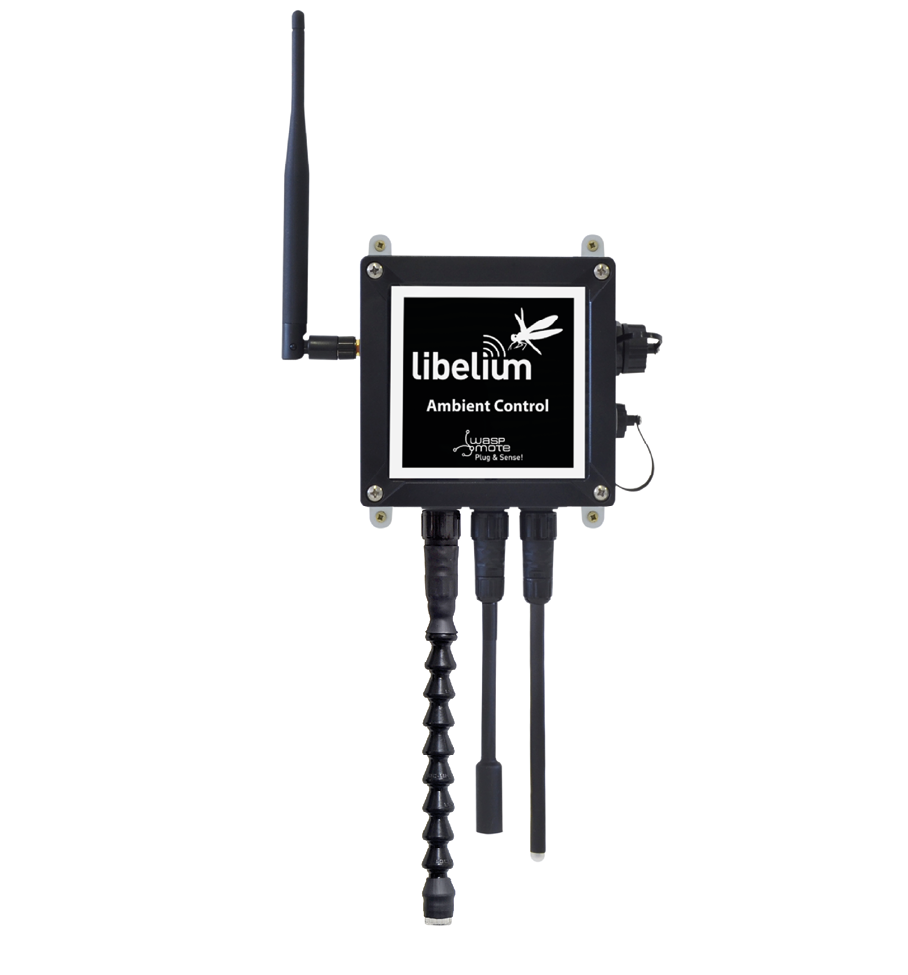
Sensor sockets are configured as it is shown in figure below.
| Sensor Socket | Parameter | Reference |
|---|---|---|
| A | Temperature + Humidity + Pressure | 9370-P |
| B | Luminosity (LDR) | 9205-P |
| C | Luminosity (Luxes accuracy) | 9325-P |
| D, E and F | Not used | - |
As we see in the figure below, thanks to the directional probe, the Luminosity (Luxes accuracy) sensor probe may be placed in different positions. The sensor can be focused directly to the light source we want to measure.
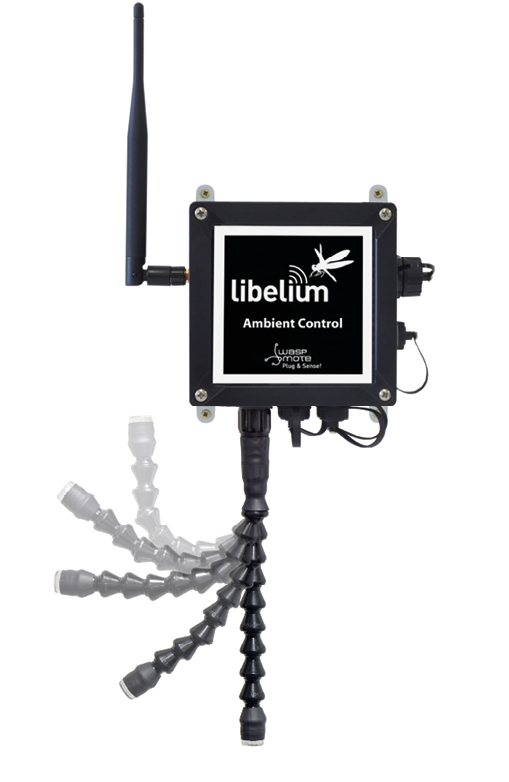
{warning.fa-dot} For more technical information about each sensor probe go to the Development section on the Libelium website.
Smart Cities PRO
The main applications for this Waspmote Plug & Sense! model are noise maps (monitor in real time the acoustic levels in the streets of a city), air quality, waste management, smart lighting, etc. Refer to Libelium website for more information.
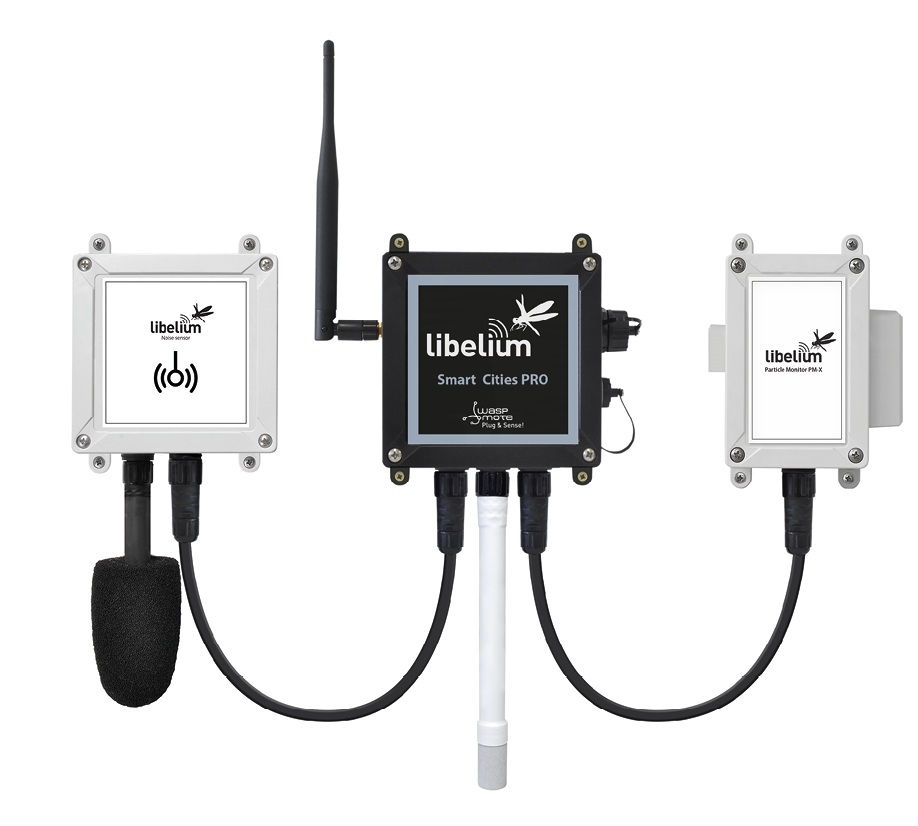
Sensor sockets are configured as shown in the figure below.
| Sensor Socket | Parameter | Reference |
|---|---|---|
| A | Noise level sensor | NLS |
| A | Temperature + Humidity + Pressure | 9370-P |
| A | Luminosity (Luxes accuracy) | 9325-P |
| A | Ultrasound (distance measurement) | 9246-P |
| B, C, and F | Carbon Monoxide (CO) for low concentrations [Calibrated] | 9371-LC-P |
| B, C, and F | Carbon Dioxide (CO 2 ) [Calibrated] | 9372-P |
| B, C, and F | Oxygen (O 2 ) [Calibrated] | 9373-P |
| B, C, and F | Ozone (O 3 ) [Calibrated] | 9374-P |
| B, C, and F | Nitric Oxide (NO) for low concentrations [Calibrated] | 9375-LC-P |
| B, C, and F | Nitric Dioxide (NO 2 ) high accuracy [Calibrated] | 9376-HA-P |
| B, C, and F | Sulfur Dioxide (SO 2 ) high accuracy [Calibrated] | 9377-HA-P |
| B, C, and F | Ammonia (NH 3 ) for low concentrations [Calibrated] | 9378-LC-P |
| B, C, and F | Ammonia (NH 3 ) for high concentrations [Calibrated] | 9378-HC-P |
| B, C, and F | Methane (CH 4 ) and Combustible Gas [Calibrated] | 9379-P |
| B, C, and F | Hydrogen Sulfide (H 2 S) [Calibrated] | 9381-P |
| B, C, and F | Hydrogen Chloride (HCl) [Calibrated] | 9382-P |
| B, C, and F | Temperature + Humidity + Pressure | 9370-P |
| B, C, and F | Luminosity (Luxes accuracy) | 9325-P |
| B, C, and F | Ultrasound (distance measurement) | 9246-P |
| D | Particle Matter (PM1 / PM2.5 / PM10) - Dust | 9387-P |
| E | Temperature + Humidity + Pressure | 9370-P |
| E | Luminosity (Luxes accuracy) | 9325-P |
| E | Ultrasound (distance measurement) | 9246-P |
{warning.fa-dot} For more technical information about each sensor probe go to the Development section on the Libelium website.
Calibrated gas sensors are manufactured once the order has been placed to ensure maximum durability of the calibration feature. The manufacturing process and delivery may take from 4 to 6 weeks. The lifetime of calibrated gas sensors is 6 months working at maximum accuracy. We strongly encourage our customers to buy extra gas sensors to replace the original ones after that time to ensure maximum accuracy and performance.
4-20 mA Current Loop
The applications for this Plug & Sense! model are focused on adding wireless connectivity to 4-20 mA devices and connecting them to the Cloud.
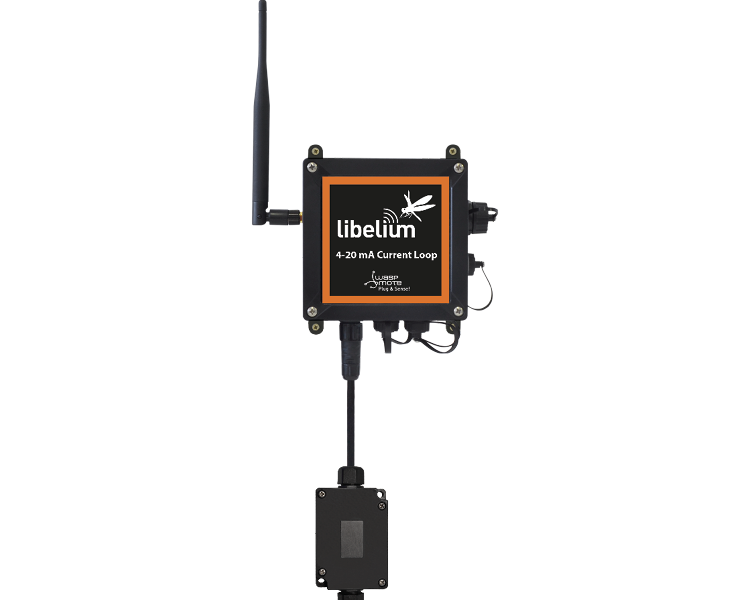
Sensor sockets are configured as shown in the figure below.
| Sensor Socket | Board channel | Reference |
|---|---|---|
| A | Channel 1 (type 2 and type 3) | 9270-P, DB9-P |
| B | Channel 2 (type 2 and type 3) | 9270-P, DB9-P |
| C | Channel 3 (type 2 and type 3) | 9270-P, DB9-P |
| D | Channel 4 (type 4) | 9270-P, DB9-P |
{warning.fa-dot} For more technical information about each sensor probe go to the Development section on the Libelium website.